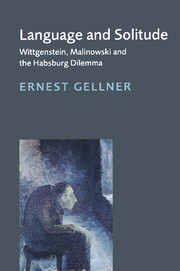Book contents
- Frontmatter
- Contents
- Preface
- Foreword
- Part I The Habsburg dilemma
- Part II Wittgenstein
- 10 The loneliness of the long-distance empiricist
- 11 The poem to solitude, or: confessions of a transcendental ego who is also a Viennese Jew
- 12 Ego and language
- 13 The world as solitary vice
- 14 The mystical
- 15 The central proposition of the Tractatus: world without culture
- 16 Wittgenstein mark 2
- 17 Tertium non datur
- 18 Joint escape
- 19 Janik and Toulmin: a critique
- 20 The case of the disappearing self
- 21 Pariah communalism
- 22 Iron cage Kafka-style
- Part III Malinowski
- Part IV Influences
- Part V Conclusions
- General bibliography
- Bibliographies of Ernest Gellner's writings on Wittgenstein, Malinowski, and nationalism
- Index
13 - The world as solitary vice
Published online by Cambridge University Press: 05 March 2010
- Frontmatter
- Contents
- Preface
- Foreword
- Part I The Habsburg dilemma
- Part II Wittgenstein
- 10 The loneliness of the long-distance empiricist
- 11 The poem to solitude, or: confessions of a transcendental ego who is also a Viennese Jew
- 12 Ego and language
- 13 The world as solitary vice
- 14 The mystical
- 15 The central proposition of the Tractatus: world without culture
- 16 Wittgenstein mark 2
- 17 Tertium non datur
- 18 Joint escape
- 19 Janik and Toulmin: a critique
- 20 The case of the disappearing self
- 21 Pariah communalism
- 22 Iron cage Kafka-style
- Part III Malinowski
- Part IV Influences
- Part V Conclusions
- General bibliography
- Bibliographies of Ernest Gellner's writings on Wittgenstein, Malinowski, and nationalism
- Index
Summary
Arthur Schopenhauer had spoken of the world as either Will or as Idea. He was, it would seem, one of the few philosophers actually to have directly influenced Wittgenstein. Wittgenstein worked out an image of the world not merely ‘as Idea’, but as an idea inherently held by a lone individual consigned to conceptual solitary confinement. This is, in effect, the plot of the Tractatus, or rather one of them: as we have stressed, that work has two superimposed themes, not distinguished and clearly separated. Apart from the solitude of the individual, bounded by the limits of his perceptual field which he cannot even see, let alone transcend, there is also the alienation of an unutterably dreary language, restricted to soulless photocopying of isolated ‘facts’ and their mechanical summation. The nature of language, as well as the condition of the self, is enough to drive one to despair … The loneliness of the transcendental ego is old hat in philosophy: alienation and solitude in virtue of the very form of language is rather more original. The basic plot of Wittgenstein's philosophical life was to be that the two predicaments are conflated, and then the alienating theory of language is decreed false, the realisation of which is held to liberate the prisoner from both sets of chains.
One of the most striking statements in the Tractatus, which is not short of striking statements, reads as follows: ‘Death is not an event in life’ (Wittgenstein 1974: 72, proposition 6.4311). He also observed that life has no limits, rather in the way the visual field has none (if we look at it, the limit is no longer there).
- Type
- Chapter
- Information
- Language and SolitudeWittgenstein, Malinowski and the Habsburg Dilemma, pp. 62 - 64Publisher: Cambridge University PressPrint publication year: 1998



